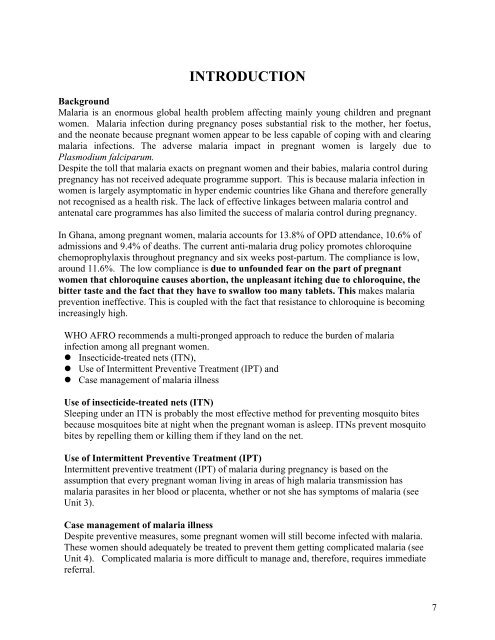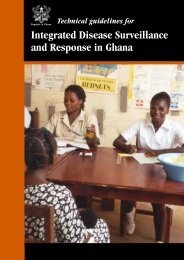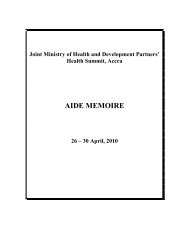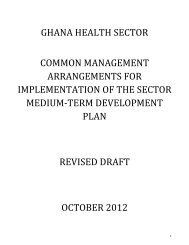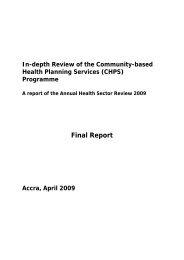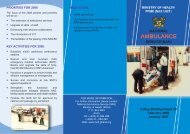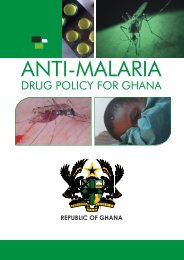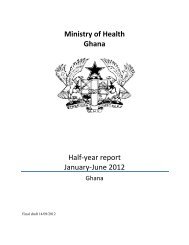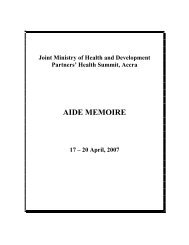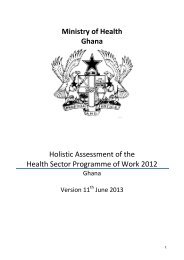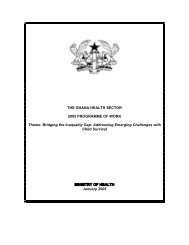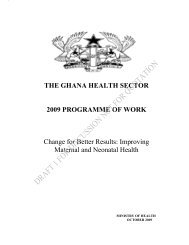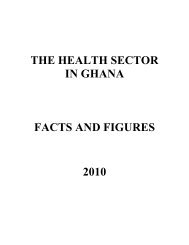Training Manual for Preventive Malaria - Ministry of Health
Training Manual for Preventive Malaria - Ministry of Health
Training Manual for Preventive Malaria - Ministry of Health
Create successful ePaper yourself
Turn your PDF publications into a flip-book with our unique Google optimized e-Paper software.
INTRODUCTION<br />
Background<br />
<strong>Malaria</strong> is an enormous global health problem affecting mainly young children and pregnant<br />
women. <strong>Malaria</strong> infection during pregnancy poses substantial risk to the mother, her foetus,<br />
and the neonate because pregnant women appear to be less capable <strong>of</strong> coping with and clearing<br />
malaria infections. The adverse malaria impact in pregnant women is largely due to<br />
Plasmodium falciparum.<br />
Despite the toll that malaria exacts on pregnant women and their babies, malaria control during<br />
pregnancy has not received adequate programme support. This is because malaria infection in<br />
women is largely asymptomatic in hyper endemic countries like Ghana and there<strong>for</strong>e generally<br />
not recognised as a health risk. The lack <strong>of</strong> effective linkages between malaria control and<br />
antenatal care programmes has also limited the success <strong>of</strong> malaria control during pregnancy.<br />
In Ghana, among pregnant women, malaria accounts <strong>for</strong> 13.8% <strong>of</strong> OPD attendance, 10.6% <strong>of</strong><br />
admissions and 9.4% <strong>of</strong> deaths. The current anti-malaria drug policy promotes chloroquine<br />
chemoprophylaxis throughout pregnancy and six weeks post-partum. The compliance is low,<br />
around 11.6%. The low compliance is due to unfounded fear on the part <strong>of</strong> pregnant<br />
women that chloroquine causes abortion, the unpleasant itching due to chloroquine, the<br />
bitter taste and the fact that they have to swallow too many tablets. This makes malaria<br />
prevention ineffective. This is coupled with the fact that resistance to chloroquine is becoming<br />
increasingly high.<br />
WHO AFRO recommends a multi-pronged approach to reduce the burden <strong>of</strong> malaria<br />
infection among all pregnant women.<br />
• Insecticide-treated nets (ITN),<br />
• Use <strong>of</strong> Intermittent <strong>Preventive</strong> Treatment (IPT) and<br />
• Case management <strong>of</strong> malaria illness<br />
Use <strong>of</strong> insecticide-treated nets (ITN)<br />
Sleeping under an ITN is probably the most effective method <strong>for</strong> preventing mosquito bites<br />
because mosquitoes bite at night when the pregnant woman is asleep. ITNs prevent mosquito<br />
bites by repelling them or killing them if they land on the net.<br />
Use <strong>of</strong> Intermittent <strong>Preventive</strong> Treatment (IPT)<br />
Intermittent preventive treatment (IPT) <strong>of</strong> malaria during pregnancy is based on the<br />
assumption that every pregnant woman living in areas <strong>of</strong> high malaria transmission has<br />
malaria parasites in her blood or placenta, whether or not she has symptoms <strong>of</strong> malaria (see<br />
Unit 3).<br />
Case management <strong>of</strong> malaria illness<br />
Despite preventive measures, some pregnant women will still become infected with malaria.<br />
These women should adequately be treated to prevent them getting complicated malaria (see<br />
Unit 4). Complicated malaria is more difficult to manage and, there<strong>for</strong>e, requires immediate<br />
referral.<br />
7


